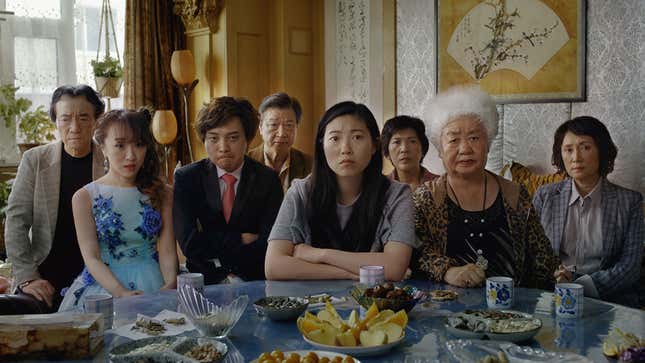
Screenshot: Big Beach
The lies in The Farewell, Lulu Wang’s sophomore effort, are multifaceted—some big, some large, all uttered with the intent to placate, soothe, and protect. In the film’s opening sequence, Billi (Awkwafina, radiant and heartbreaking), walks down a busy street in New York on the phone with her grandmother, Nai Nai (Zhao Shuzhen), catching up and telling lies. Nai Nai is concerned about the weather and asks if she’s wearing a hat; Billi replies that she is, though it is clear to us that she’s not. There are other lies, too, that trip off the tongue, scattered throughout the film, that make it seem like lying is tantamount to breathing—a necessary side effect of the arduous work of being alive. Keeping track of the lies sprinkled throughout the film is pointless, because, with the exception of one big whopper, they are are harmless: a simple reinterpretation of facts such that the answer to any question asked poses no harm. A lie is a shield, deployed in a last-ditch attempt to spare someone from real hurt. Often times, the small lie goes unnoticed, woven into the fabric of existence, and otherwise ignored. But sometimes, the lie in question is larger than itself and its consequences, far reaching.
Spoilers ahead.
In The Farewell, a big lie rests at the center of everything: Nai Nai has Stage IV lung cancer, and her entire family is keeping the truth from her. Instead of staging a protracted, drawn-out end of life, Billi’s family has orchestrated a reason for everyone to get together in Changchun, China: Billi’s cousin is getting married to a woman he’s been dating for three months, part actual wedding and part ruse. Billi’s parents, who moved to the United States from Changchun when Billi was a child, are hesitant to let her come to China at all, fearing her American emotions will give everything away.
-

-

-

-

-

-

-

-

-

-

-

-

-

-

-

-

-

-

-

-

-

-

-

-

-

-

-

-

-

-

-

-

-

-

-

-

-

-

-

-








































